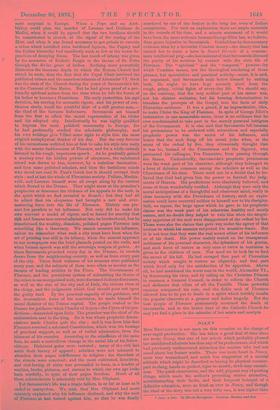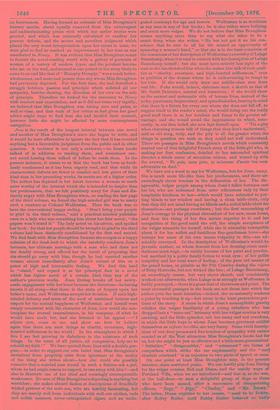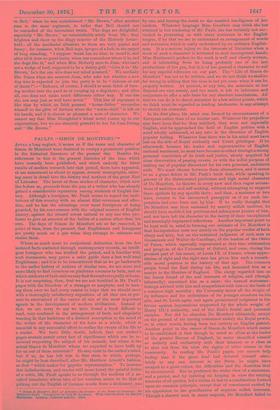JOAN.*
Mass BROUGHTON is not open on this occasion to the charge of over-rapid production. She has taken a good deal of time since she wrote Nancy, that one of her novels which probably pleased her established admirers less than any of its predecessors, and which had previously undiscovered attraction for readers who had not cared about her former works. There was more heart in Nancy, more true womanhood, and much less suggestion of a mental attitude which might be described as having its physical counter- part in slang, hands-in-pocket, cigar-in-mouth, devil-may-careish- ness. The quick observation, and the odd, piquant way of putting things, which made the author's preceding stories attractive, notwithstanding their faults, and their frequent betrayal of a defective education, were as fresh as ever in Nancy, and though the ideal of the story was not a very lofty one, it was higher than • Joan: a Tale. By Rhoda Broughton. London: Bentley end Son. its forerunners. Having formed an estimate of Miss Broughton's literary merits, about equally removed from the extravagant and undiscriminating praise with which her earlier stories were greeted, and which was eminently calculated to confirm her gravest defects, and the severe and merciless judgment which placed the very worst interpretation upon her errors in taste, we were glad to find so marked an improvement in her tone as was manifested in Nancy. It wiss evident that Miss Broughton meant to furnish the novel-reading world with a gallery of portraits of women of a variety of modern types, and the petulant heroine who sat on the wall, and seemed at one period in her story likely to -come to an end like that of " Humpty Dumpty," was a much better, wholesomer, and more real person than any whom Miss Broughton had previously depicted. For the first time, she had described a struggle between passion and principle which enlisted all our sympathy, besides showing the direction of her own on the side -of principle. Therefore we looked for the successor to Nancy with interest and expectation, and as it did not come very rapidly, we believed that Miss Broughton was taking care and pains, as well as time, and that such of her Critics as had given her good advice might hope to find that she had heeded their counsel, however little she might be affected by mere contemptuous -castigation.
Joan is the result of the longest interval between one novel and another of Miss Broughton's since she began to write, and it would be mere affectation to ignore the fact that it has received anything but a favourable judgment from the public and in other -quarters. A reviewer is not only a reviewer,—he hears hooka :talked of in addition to reading them, and sometimes can- not avoid hearing them talked of before he reads them. In the present instance, it seems to us that the book has been as heed- lessly condemned as it has been eagerly read, and that while its -characteristic defects are fewer in number and less grave of their kind than in her preceding works, its merits are of a higher order. The author has depicted in her latest heroine a woman so much more worthy of the interest which she is intended to inspire than her predecessors, that we felt positively sorry for Joan and dis- tinctly angry with Miss Broughton when, on reading the last page -of the third volume, we found the high-minded girl was to marry such a creature as Colonel Wolferstan. Thus the book was to have the conventional happy ending. "Don't bring your people to grief in the third volume," said a practical-minded publisher -once to a lady who was consulting him about her first novel ; "the papers won't stand it." The lady acted on his advice, and spoiled ter book; for that her people should be brought to grief in the third volume had been distinctly conditioned by the first and second. We find fault with Miss Broughton because she accepts as a happy solution of the dead-lock to which she carefully conducts Joan's. fortunes, her ultimate marriage with a man who had done her the deadly wrong, and offered her the insult of proposing that -she should go away with him, though he had married another woman almost immediately after Joan's refusal of him on a point of high and honourable feeling. We find this hard to "stand," and regard it as the principal flaw in a novel which has higher merit of a certain kind than any of the author's previous works. Joan Dering breaks off her newly- made engagement with her lover because she discovers—he having known it all along—that there is the stain of forgery upon her father's name, and Wolferstan accepts her decision. If such high- minded delicacy and sense of the need of unstained honour and respect for the mutual happiness of Wolferstan and herself were simply consistent with the character of Joan, how could she con- template the eternal remembrance, in his company, of what he would have made her, had she listened to his appeal :—"I adjure you, come to me, and show me how to believe again that there are such things as charity, reverence, high- hearted selflessness in the world ! In the atmosphere in which I live I am fast growing to disbelieve in the existence of such things. In the name of all justice, all compassion, help me to rebuild my faith !" We have quoted these lines with a double par- pose,—in order to support our own belief that Miss Broughton's deviations from propriety arise from ignorance of the reality -of the thing she writes about—how else could she possibly -conceive that a married man would in such a fashion ask a girl, whom he had ample reason to respect, to run away with him ?—and -also to illustrate one of her chief and seemi ely unconquerable
weaknesses. No man of Miss Broughton's depicting is anything but worthless ; she makes absurd dashes at descriptions of dreadfully
wicked persons of the male sex, who are terribly fascinating, but they are merely well-born individuals with well-cut clothes, rude and selfish manners, never-extinguished cigars, and an undis-
guised contempt for age and sorrow. Wolferstan is as worthless as any man in any of her books ; he is also rather more bullying and much more vulgar. We do not believe that Miss Broughton means anything more than to say what she takes to be a smart thing when she writes, "He has not got it on his con- science that he ever in all his life missed an opportunity of
squeezing a woman's hand," or that she is in the least conscious of the coarseness of her description of Wolferstan's courtship of Lalage Beauchamp, when it is read in context with her description of I slage
Beauchamp herself ; but she must have entirely lost sight of the man as she has sketched him when she makes him talk of such quali- ties as "charity, reverence, and high-hearted selflessness," even
as qualities of the woman whom he is endeavouring to tempt to her ruin. If she would only draw one middle-class man from real life ; if she would, indeed, elaborate such a sketch as that of Mr. Smith Deloraine, natural and humorous ; if she would show us the earnest and systematic side of human lives, instead of the jerky, passionate, fragmentary, and episodical sides, bearing in mind that there is a future for every one whom she does not kill off, to suggest itself to the reader's mind, she would bring out the really good stuff there is in her intellect and fancy to far greater ad- vantage, and she would avoid the imputations to which, inno- cently, in our firm belief, she now lays herself open. "'Tis a pity when charming women talk of things that they don't understand," said an old song, truly, and the pity is all the greater when the things in question are such as they could not well understand. There are passages in Miss Broughton's novels which constantly remind one of that delightful French story of the little girl who, in making her first confession, detailed to her astounded spiritual director a whole series of atrocious crimes, and wound up with the avowal, "Et puis, mon pere, je m'accuse d'avoir tad mon adversaire en duel."
We have not a word to say for Wolferstan, but for Joan, many. She is much more life-like than her predecessors, and there are exceedingly clever touches in the delineation of her. The dis- agreeable, vulgar people among whom Joan's fallen fortunes cast her lot, who are redeemed from utter odiousness only by their hospitable kindness to her—which would have extended to put- ting blinds to her window and having a clean table-cloth, only that they did not mind having no blinds and a soiled table-cloth for themselves—are perhaps overdrawn ; but the first succumbing of Joan's courage to the physical discomfort of her new, mean home, and then the rising of her fine nature superior to it, and her recognition of the good amid the evil, the simple acceptance of the vulgar scramble for herself, while she is miserably susceptible about it for her selfish and fastidious fine-gentleman lover—she betrays her sense of his own innate vulgarity in this—are ad- mirably conveyed. In the description of Wolferstan's would-be juvenile mother, on whose descent from her dressing-room semi- darkness must reign,—in reality because of her paint and powder, but ascribed by a polite family fiction to weak eyes ; of her polite insipidity and her total want of feeling; of the poor old master of the grand house, as pitiable as Sir Pitt Crawley daring the rigime of Betsy Horrocks, but not wicked like him; of Lalage Beauchamp, an exceedingly coarse, but very clever sketch, and consistently worked out afterwards, when Lalage is as strongly as Wolferstan is feebly portrayed,—there is a great deal of cleverness and point. The most successful passages in the book are not those into which the author puts the most intention—indeed, she occasionally weakens a point by touching it up—but occur in the least pretentious por- tions of the story. A scene in which Joan's monosyllabic gravity rebukes the vulgar familiarity of a young subaltern who has dropped into a "tame-cat" intimacy with her- vulgar cousins is very amusing, and the little episodes, not too many and not overdone, in which the little boys to whom Joan becomes governess exhibit themselves as enfants terribks, are very funny. Some vivid descrip- tions of out-door penes and fine touches of sympathy with nature remind us of the first attraction Miss Broughton's books had for us, but she might be just as effective and a little more grammatical " Suitabler," " disagreeabler," and " solemnest " are forms of comparison which strike the ear unpleasantly, and the "sun chariots overhead" is an injustice to two parts of speech at once.
On one point at least Miss Broughton may, in the present instance, claim unstinted praise. We can hardly pity Joan Dering for the vulgar cousins, Bell and Diana, and the untidy ways of Portland Villa, when we are introduced—and that is, as she was, at the hall-door—to such a delightful group of dogs as those who have been named, after a succession of disappointing officers, " Regy," " Algy," "Charley," and "Mr. Brown." The latter, Diana explains to her cousin, "used to be Bobby, after Bobby Butler, until Bobby Butler behaved so badly to Bell," when he was rechristened "Mr. Brown," after another man in the same regiment, in order that Bell should not be reminded of the inconstant swain. The dogs are delightful, especially "Mr. Brown," an unmistakable study" from life ; they brighten and cheer up the dingy interior of the Moberly house- hold ; all the incidental allusions to them are very quaint and funny ; for instance, when Bell says, apropos of a hole in the carpet of long standing, " 1 suppose Sarah has no time to mend it, and after all it does no great harm, when one remembers where it is, and the dogs like it," and when Mrs. Moberly says to Joan, who can't eat a wedge of beef, supposed to be a dainty grill, "Give it to Mr. Brown,' he's the one who does not mind mustard." We cordially like Diana when she answers Joan, who asks her whether a new dog who is expected to join the party is to be "indoors or out of doors ?"—" Indoors, of course, I should as soon think of turn- ing mother into the yard as of cooping up a dog there ; and after all, one does not make much difference either way. If one has six, one may just as well have seven." This line of argument is like that by which an Irish peasant " house-father " reconciles himself to the gifts of fortune when the " nurse-child " is left on his hands, and it is almost as pleasant a note of character. We cannot say that Miss Broughton's latest novel comes up to our expectations, but we are sincerely grateful to her for Joan Dering and "Mr. Brown."




































 Previous page
Previous page